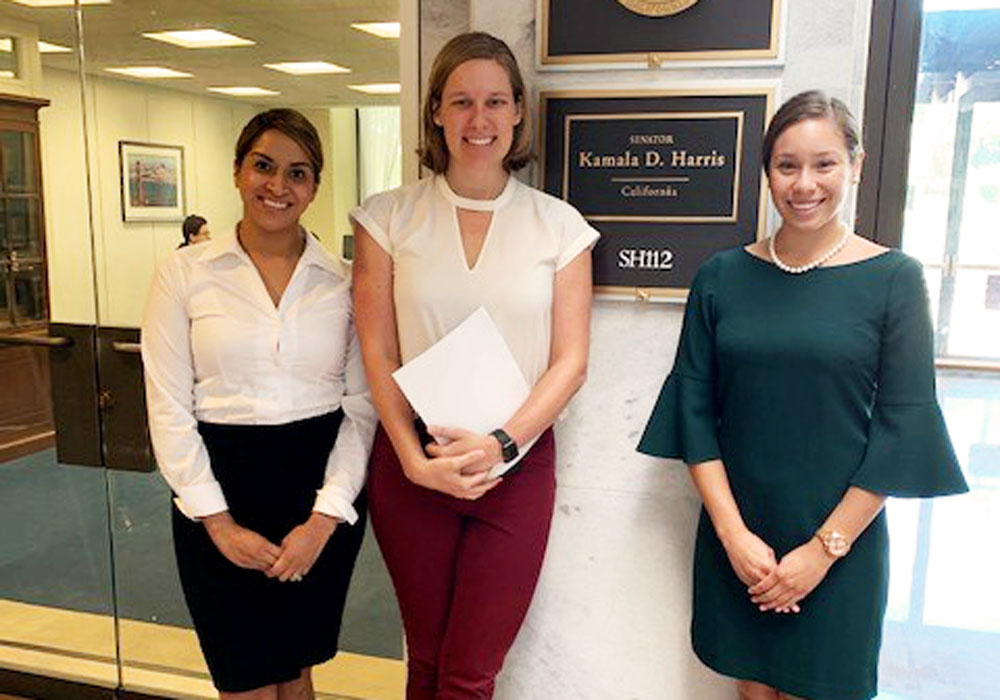By Samara Lucas, BSN, RN
With our heads held high, Michelle Santizo, RN, PHN, MSN, and I walked right into Capitol Hill, ready to tackle meetings with important members of the U.S. Congress. On that day in July 2019, we spoke with staff members working for the offices of both Kamala Harris (D-CA) and Diane Feinstein (D-CA).
Advocating for Improved Cost Coverage
The first of many bills we discussed was the Cancer Drug Parity Act (H.R. 1730/S. 741), which would remove cost disparities between IV chemotherapy administration and oral chemotherapy administration. Currently, IV chemotherapy is covered in Medicare whereas oral chemotherapy is not. This leads to huge financial burdens to patients who need oral chemotherapy for their treatment. An example we used to discuss the issue was a subcutaneous chemotherapy injection that needs to be mixed continuously for five minutes by hand to keep it warm. If the mixture isn’t warm during its injection, it crystalizes and causes bruising, pain, and hardening at the injection site. But the same drug is also available in a pill form. Why isn’t Medicare covering that? Why make our patients suffer more? By eliminating the cost disparity between IV chemotherapy and oral chemotherapy, we can ensure our patients obtain proper oral administration without enduring unnecessary pain or financial hardship.
We also discussed the Lymphedema Treatment Act (H.R. 1948/S. 518), which would require Medicare to cover compression stockings as a treatment for lymphedema. Without the stockings, patients can experience significant pain—as many nurses can attest. Thankfully, an overwhelming number of bipartisan members of the House and the Senate are already cosponsors for the two bills and, as nurse advocates, we are grateful for their support.
Championing PCHETA for Our Patients
The final bill we talked about with Senator Feinstein’s staff was the Palliative Care and Hospice Education and Training ([PCHETA]; H.R. 647). PCHETA would provide funding for education centers, training, and professional development to improve palliative care and hospice training for healthcare professionals. It would also raise awareness and provide more research for palliative care efforts.
We started by defining the difference between palliative care and hospice—which elected officials often misunderstand. We explained that palliative care is symptom management for better quality of life and can be congruent with curative treatment. We also told them that hospice is when terminally ill patients have no other curative treatment options and the focus shifts to improving quality of life.
This bill is near and dear to our hearts. An example we used when talking to Feinstein’s staff was related to a patient who had a stem cell transplant. She began to come in and out of the hospital and one day stayed because she had an enlarged liver and spleen, which caused an immense amount of abdominal pain.
Unfortunately, her pain regimen was not the best for her type of pain. The issue became worse until she started expressing feelings of suicide. As we described her situation, tears filled our eyes. It wasn’t just a case study we were sharing—I took care of this patient on one of her agonizing days and suggested to the physician that the patient might benefit from palliative care. The physician disagreed—not because he was wrong, but because he was not properly educated on palliative care versus hospice care. The patient’s pain worsened, and she was transferred to the intensive care unit where there they began palliative care efforts. But it was too late, and she passed away shortly after. We emphasized in our meeting that palliative care should start at bedside on the day of admission to ensure that no patient has to suffer in pain.
Our advocacy attempts were successful: Senator Feinstein signed onto the PCHETA bill. My colleague, friend, and fellow ONS advocate Michelle and I cried when we heard the news. They were tears of happiness, knowing that, as nurses, we can do so much more for our patients. Our efforts were recognized. I advocate for my patients because when patients are vulnerable, scared, run down, and not obtaining the resources they need, it makes care difficult. Their sole focus should be on getting better, not their constant struggles. I continue to fight to ensure that all of my patients have a voice. If I learned anything from my visit to Capitol Hill, it’s that when a nurse speaks, legislators listen.






